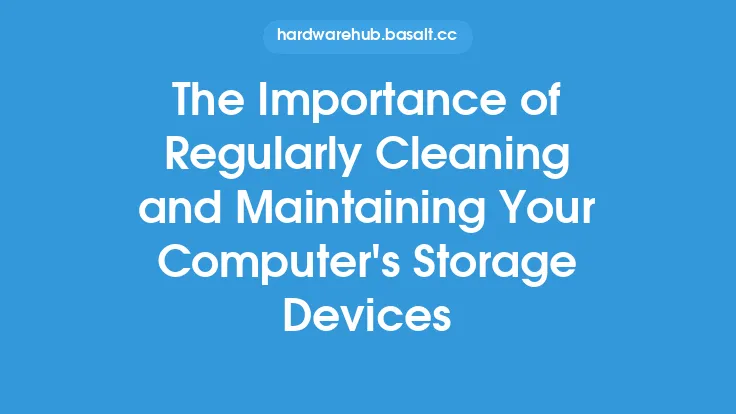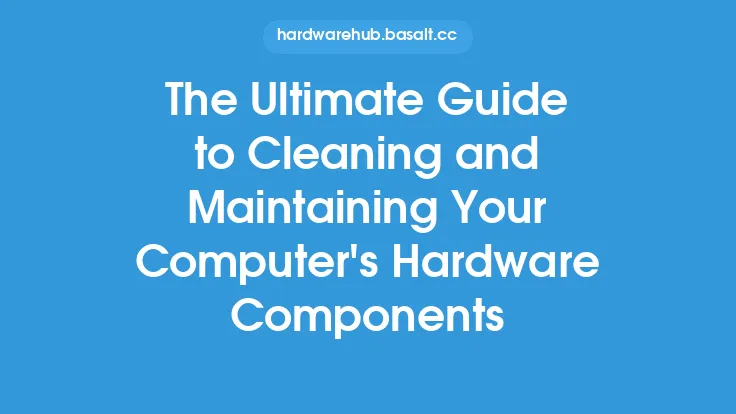Regular maintenance of a computer's cables and connectors is essential for ensuring optimal performance, reliability, and longevity of the system. Over time, dust, dirt, and other debris can accumulate on the cables and connectors, causing signal degradation, data loss, and even system crashes. In this article, we will explore the benefits of regularly cleaning your computer's cables and connectors, and provide guidance on how to do it safely and effectively.
Introduction to Cables and Connectors
Cables and connectors are critical components of a computer system, responsible for transmitting data, power, and other signals between different hardware components. They come in various types, including USB, HDMI, DisplayPort, Ethernet, and power cables, each with its own unique characteristics and requirements. The connectors, such as USB ports, HDMI ports, and power sockets, are also prone to dust and dirt accumulation, which can compromise their functionality.
The Risks of Dirty Cables and Connectors
Dirty cables and connectors can cause a range of problems, including signal degradation, data loss, and system crashes. When dust and dirt accumulate on the cables and connectors, they can create electrical resistance, which can lead to signal attenuation, distortion, and even complete signal loss. This can result in poor system performance, errors, and crashes. Furthermore, dirty cables and connectors can also increase the risk of electrical shock, fires, and other safety hazards.
Benefits of Cleaning Cables and Connectors
Regularly cleaning your computer's cables and connectors can bring numerous benefits, including:
- Improved system performance: Clean cables and connectors ensure optimal signal transmission, reducing errors and crashes.
- Increased reliability: Clean cables and connectors reduce the risk of electrical shock, fires, and other safety hazards.
- Longer lifespan: Clean cables and connectors can extend the lifespan of your computer's hardware components.
- Better data integrity: Clean cables and connectors ensure accurate data transmission, reducing the risk of data loss and corruption.
- Enhanced safety: Clean cables and connectors reduce the risk of electrical shock, fires, and other safety hazards.
How to Clean Cables and Connectors
Cleaning cables and connectors requires care and attention to detail. Here are some steps to follow:
- Shut down your computer and unplug all cables and connectors.
- Use compressed air to gently blow away dust and dirt from the cables and connectors.
- Use a soft-bristled brush to gently sweep away dust and dirt from the connectors and ports.
- Use a cotton swab or a specialized cleaning solution to clean the connectors and ports.
- Avoid using harsh chemicals, abrasive materials, or excessive force, which can damage the cables and connectors.
- Use a dry cloth to wipe away any moisture or cleaning solution from the cables and connectors.
Best Practices for Cable and Connector Maintenance
To keep your computer's cables and connectors clean and functional, follow these best practices:
- Regularly inspect and clean your cables and connectors every 3-6 months.
- Use cable ties and cable management systems to keep your cables organized and secure.
- Avoid overloading your cables and connectors with excessive weight or stress.
- Use high-quality cables and connectors that are designed for your specific computer system.
- Avoid exposing your cables and connectors to extreme temperatures, humidity, or environmental conditions.
Conclusion
Regularly cleaning your computer's cables and connectors is essential for ensuring optimal performance, reliability, and longevity of your system. By following the steps and best practices outlined in this article, you can keep your cables and connectors clean and functional, reducing the risk of signal degradation, data loss, and system crashes. Remember to always handle your cables and connectors with care, and avoid using harsh chemicals or excessive force, which can damage your computer's hardware components. By taking the time to clean and maintain your cables and connectors, you can enjoy a faster, more reliable, and more efficient computer system.





